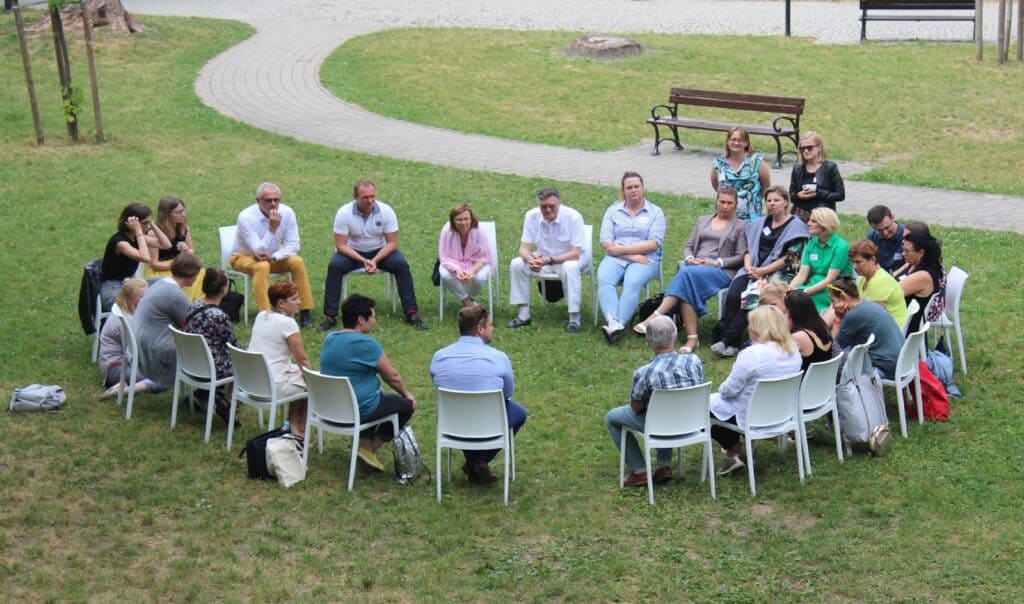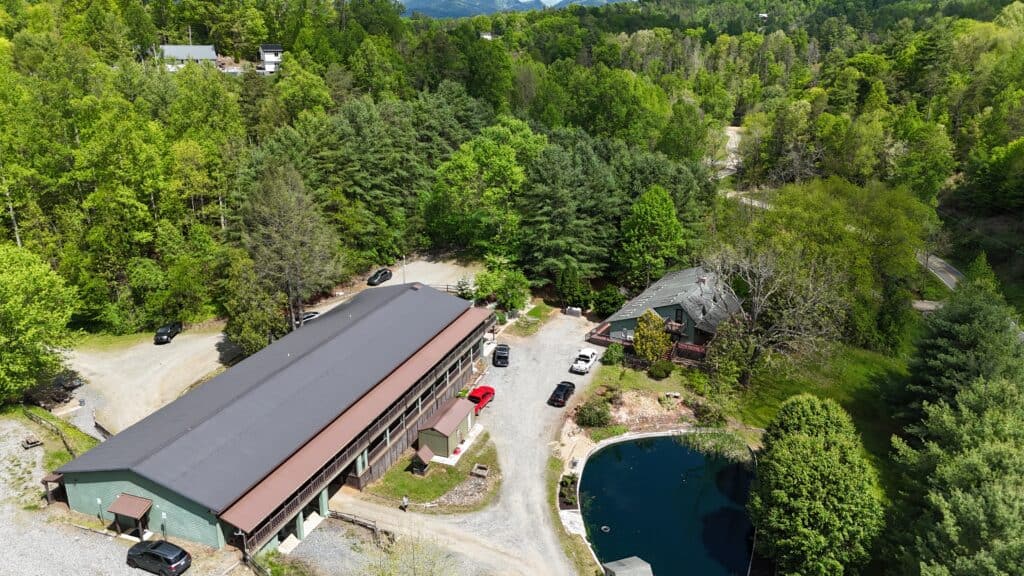Drug Rehab in Asheville, NC
Overcome addiction with compassionate, evidence-based care in the Blue Ridge Mountains.
Overcome addiction with comprehensive care at our drug rehab in Asheville NC. Asheville Recovery Center is an accredited Asheville drug rehab center providing evidence-based drug addiction treatment Asheville programs in the peaceful Blue Ridge Mountains.
Our North Carolina drug rehab programs meet the highest clinical standards, helping individuals build a foundation for lasting recovery.

Your Addiction Recovery Starts Here
JCAHO Accredited Addiction Treatment
Highest standards for drug rehab
8+ Years Treating Addiction
Proven addiction treatment expertise
95% Client Satisfaction Rate
Life-changing addiction recovery
Expert Addiction Specialists
Licensed therapists & medical staff
Our Programs
Complete Drug Rehab Programs in Asheville
We offer a full range of drug treatment in Asheville NC, including PHP and IOP levels of care. Our PHP drug rehab Asheville and IOP drug rehab Asheville programs give clients structure, therapy, and flexibility. We also coordinate detox and rehab Asheville NC through trusted medical partners for a seamless start to recovery.


Find the Right Drug Rehab Program
Not sure which level of drug rehab is right for you? Our Asheville addiction specialists will assess your needs and recommend the best treatment program for lasting recovery from substance abuse.
Why Asheville Recovery Center
Why Choose Our Drug Rehab in Asheville NC
As a leading North Carolina drug rehab, Asheville Recovery Center combines accredited, evidence-based therapy with compassionate care in the heart of the Blue Ridge Mountains. Our team helps clients transition smoothly through detox, PHP, and IOP programs to achieve lasting recovery.
Evidence-Based Addiction Treatment
Proven therapies for substance abuse including CBT, DBT, and trauma-informed care for lasting recovery.
Addiction Medicine Specialists
Board-certified addiction doctors, licensed substance abuse counselors, and psychiatric care for co-occurring disorders.
Asheville Rehab Location
Proven therapies for substance abuse including CBT, DBT, and trauma-informed care for lasting recovery.
Individualized Addiction Plans
Custom drug and alcohol treatment plans addressing your specific substances, co-occurring disorders, and recovery goals.
Family Addiction Therapy
Family counseling and education programs. Heal relationships damaged by substance abuse and build recovery support.
Holistic Addiction Recovery
Complementary therapies including yoga, meditation, nutrition counseling alongside traditional addiction treatment.
Aftercare & Relapse Prevention
Comprehensive discharge planning, alumni support, sober living referrals, and ongoing therapy to prevent relapse.
Insurance for Drug Rehab
Accept most insurance for addiction treatment. Verify coverage and explore payment options for rehab.


92%
Program Completion
24/7
Support
100%
Personalized Treatment
Our Approach
Healing the Whole You
At our drug rehab in Asheville NC, we combine proven therapies with holistic wellness to treat mind, body, and spirit. Our addiction recovery center Asheville provides CBT, DBT, EMDR, and mindfulness practices to help clients rebuild confidence and stability.
Evidence-Based Therapies
Cognitive Behavioral Therapy (CBT)
Change negative patterns and build healthier thinking
Dialectical Behavior Therapy (DBT)
Develop emotional regulation and mindfulness skills
Motivational Interviewing
Strengthen your personal motivation for change
EMDR Therapy
Process trauma and reduce painful memories
12-Step Facilitation
Connect with proven peer support networks
Specialized Programs
Trauma-Informed Care
Gentle, safe processing of past experiences
Family Therapy
Rebuild trust and heal together
Gender-Specific Groups
Share experiences in safe spaces
Relapse Prevention
Build lasting recovery skills
Life Skills Training
Prepare for independent living
We Provide Compassionate Care For All Substance Use Disorders
Medical Detox Available
We will connect you with safe, comfortable, medically supervised drug detox for opioids, benzodiazepines, stimulants, and other substances. The medical team manages withdrawal symptoms with compassion and expertise.


Nurture Your Whole Self
Mindfulness & Meditation
Find inner peace through daily guided practices that reduce stress and increase self-awareness.
Yoga & Movement
Reconnect with your body through gentle, healing yoga for all fitness levels.
Nutrition & Wellness
Restore your health with balanced meals and learn how nutrition supports recovery.
Art & Music Therapy
Express yourself and process emotions through creative outlets.
Nature & Outdoor Activities
Hiking and nature walks in the beautiful Asheville mountains.
Spiritual Exploration
Optional spiritual support in a welcoming, non-denominational setting.
Real Stories
Real Drug Addiction Recovery Success Stories
See how our Asheville drug rehab has helped people achieve lasting sobriety. Real testimonials from our substance abuse treatment graduates.
Insurance & Payment
Insurance Coverage for Drug Rehab
Most insurance plans cover treatment at our drug rehab Asheville programs. Verify your coverage and explore affordable payment options today. We accept Aetna, BCBS, Medcost, GEHA, and more – and we offer same-day rehab admission for qualified clients.



Insurance Accepted for Addiction Treatment
Blue Cross Blue Shield
Aetna
Medcost
GEHA
United Health Care
UMR
Anthem
Optum
Blue Cross Blue Shield
Blue Cross Blue Shield
Free Rehab Insurance Verification
Find out if your insurance covers drug rehab and alcohol treatment. Our admissions team verifies addiction treatment benefits at no cost.
Out-of-Network? No Problem
Even if we’re not in your network, you may still have benefits that cover much of the cost. We can help you understand your options.
Self Pay & Payment Plans
If you prefer to pay privately or don’t have insurance, we offer transparent pricing and flexible financing options.
Your Recovery is Worth It
Don’t let financial concerns keep you from getting the help you need. Our team will work with you to find a solution that makes treatment possible.
Common Questions
Drug Rehab FAQs – Asheville, NC
Common questions about drug addiction treatment programs, detox, insurance coverage, and what to expect in rehab.
Questions About Addiction Treatment?
Our addiction admissions specialists are available to answer questions about drug rehab, alcohol treatment, detox, insurance coverage, and recovery programs. Confidential consultation with no obligation.
We’re Here For You
Get Help for Drug & Alcohol Addiction Today
Start your addiction recovery journey with a confidential assessment. Our addiction specialists are available 24/7 to discuss treatment options, verify insurance, and arrange immediate rehab admission.
24/7 Helpline
(828) 518-6996
Always someone here to help
Email Us
help@ashevillerc.com
Visit Us
9 Old Burnsville Hill Rd,
Asheville, NC 28804
Confidential Addiction Help
Learn more about addiction recovery standards from SAMHSA (Substance Abuse and Mental Health Services Administration).
Start Addiction Treatment Today
Request a free addiction assessment. We’ll call within 15 minutes to discuss drug rehab options and verify insurance.
